Waqf Amendment Bill 2025 Passed in the Rajya Sabha: Bold Move Sparks Controversy and Hope!
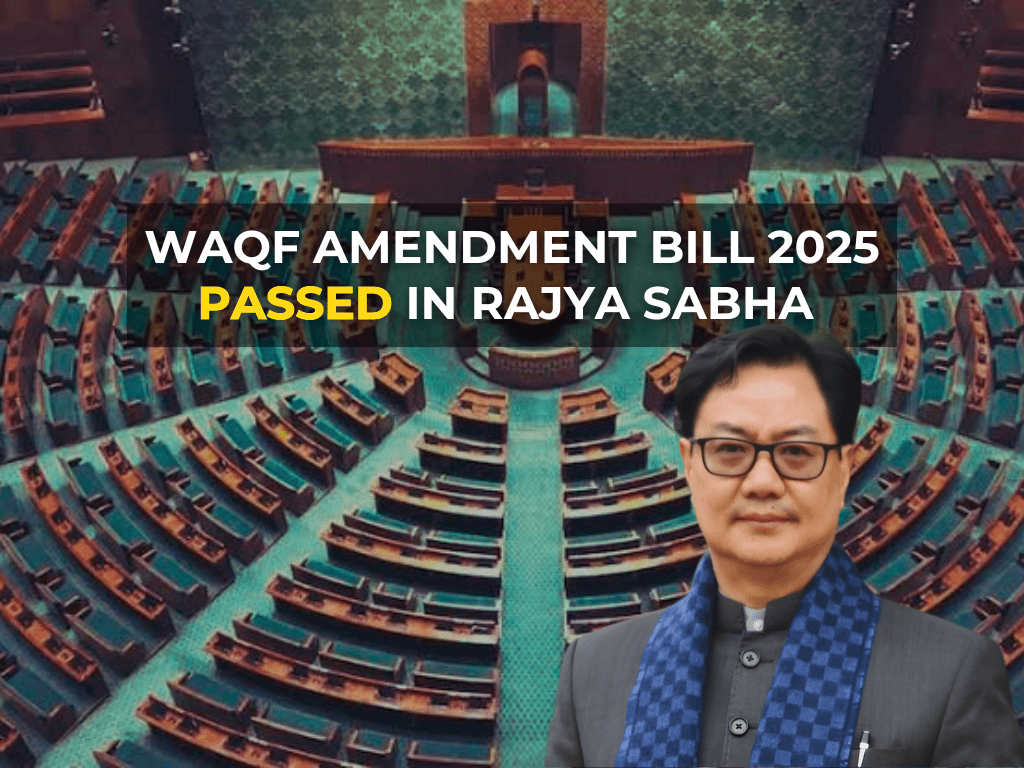
Waqf Amendment Bill 2025 which has been a topic of intense debate and discussions recently has been passed finally. On 2 April 2024, the Waqf Amendment Bill 20245 was introduced for discussion in the Lower House by our hon’ble Minister of Minority Affairs Kiren Rijiju.
After an intense 12 hours long debate, the Waqf Amendment Bill 2025 was passed in the Lok Sabha at 2:08 AM on 3 April, 2025 with a majority of 288 votes favouring the bill and 232 votes against the enactment of the Waqf Amendment Bill 2025.
As per the procedure for passing any bill, the Waqf Amendment Bill was then presented for discussions in the Upper House or Rajya Sabha at 11:00 AM on 3rd April 2025. A total of 8 hours were allotted for the debate and discussions.
Finally, after several heated exchanges, the Waqf Amendment Bill was approved by the Rajya Sabha as well on 4th April 2025 at around 2:29 AM. The Waqf Amendment Bill 2025 was passed with a majority of 128 votes in its favour whereas 95 votes were against it.
After the Waqf Amendment Bill cleared both Houses, i.e., the Lok Sabha and the Rajya Sabha, it required the President’s final approval to be enacted.
Notably, the President can either assent the bill or return the bill for reconsideration suggesting changes. Once these suggested changes are addressed, the President is constitutionally bound to approve the bill except for specific cases.
The Waqf Amendment Bill 2024-25 has faced very strong opposition from various parties outside and inside the Parliament. It is noted that there have been a lot of misconceptions around the Waqf Amendment Bill 2025.
So let’s understand the underlying issues which this Waqf amendment Bill 2025 is meant to solve, the key changes made in the former Waqf Act and how these amendments will affect the functioning of the Waqf Board and it’s implications on common citizens.
Readers can use the Table of Contents to navigate to their topic of interest relating to the Waqf Amendment Bill 2024 as per their convenience.
Table of Contents
What is the Waqf Board?
‘Waqf’ refers to those properties or assets which have been donated for religious and charitable purposes under Islamic law. Such properties can’t be sold or transferred later. The Waqf Board is an autonomous and independent body which manages Waqf properties. The Waqf Board is appointed by the government under the Waqf Act 1995.
Waqf Board functions at 2 levels :
(1) State Waqf Boards : Each state has its own Waqf Board which regulates Waqf properties of that particular state. The members of this state Waqf Board are appointed by the government as per the Waqf Act 1995.
(2) Central Waqf Council (CWC) – It is a national-level body that manages the functioning of State Waqf Boards. The Central Waqf Council comes under the Ministry of Minority Affairs.
Functions of the Waqf Board
The Waqf Board plays a major role in managing Waqf properties donated for religious or charitable purposes. So, these properties require proper administration to prevent misuse. The board’s primary functions include :
(i) Ensuring that Waqf properties such as mosques, dargahs, graveyards etc are maintained and utilized for their intended purpose.
(ii) Preventing unauthorized occupation/encroachment of the Waqf properties.
(iii) Preventing the illegal sale of Waqf lands and assets.
(iv) Regulating the income generated from Waqf properties and directing it for providing scholarships, health services, and community development.
(v) Keeping an updated database of all registered Waqf properties. Work towards digitizing the Waqf land records for transparency.
(vi) Handling conflicts related to Waqf properties such as boundary disputes, claims of mismanagement etc.
(vii) Utilizing Waqf funds for social projects like schools, hospitals, and housing schemes for the poor.
Although this was meant for a social cause, the Waqf Board was accused of transparency issues and corruption charges. It was done by misusing some of the provision of the Waqf Act 1995.
Here is a brief overview of the evolution of Waqf laws in post-independence India. We will trace how these provisions were misused, resulting in illegal encroachments and property disputes.
Initial Versions of the Waqf Act Explained
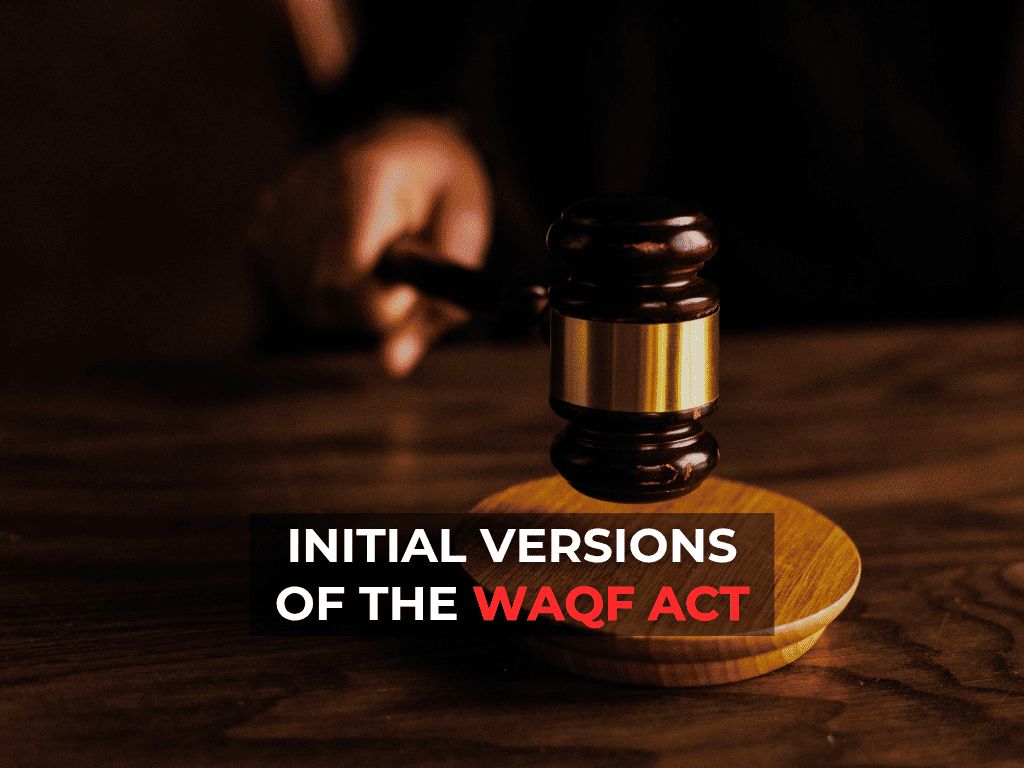
The Waqf Act, 1954 was the first post-independence legislation to regulate Waqf properties in India. It introduced State Waqf Boards to regulate the Waqf properties. Registration of Waqf properties was made mandatory to prevent illegal use. However, lack of strict enforcement and corruption led to mismanagement and illegal land occupations.
Years later, the Waqf Act, 1954 was replaced by the Waqf Board Act 1995. It established the Central Waqf Council (CWC) to monitor the State Waqf Boards and promote legality.
The Waqf Act, 1995 gave more powers to the Waqf Boards against illegal encroachments and provision to reclaim the Waqf properties.
For instance, the Section 40 and 85 of the Waqf Act 1995 which allowed the Waqf Board to declare any property as Waqf with little opposition.
Moreover, the Civil Courts were exempted from intervening in Waqf-related disputes. The legal issues relating to the Waqf Board were meant to be resolved in the Waqf tribunals only.
Problems in the Waqf Board
Due to such controversial provisions under the Waqf Act 1995, the Waqf Board was seen illegally claiming properties that didn’t belong to it. But due to the unfair legal advantage bestowed upon the Waqf Board, the burden of proof was shifted on the opposing party. And the disputed land was declared Waqf property unless proved otherwise.
The Waqf Board has made several bizarre and controversial property claims over the years, which were later challenged and proven false through legal & government interventions. Some of them are as follows :
(1) Ramlila Maidan, Delhi (2011) : Delhi Waqf Board declared Ramlila Maidan as Waqf property. But the Delhi High Court ruled that it belongs to the Delhi Development Authority(DDA).
(2) Land Near Supreme Court, Delhi (2014) : Delhi Waqf Board claimed 1.77 acres of land near the Supreme Court as Waqf property. But the High Court and the government rejected the claim, stating it belongs to the Land & Development Office (L&DO).
(3) 123-Year-Old Mankameshwar Temple, Agra (2023) : UP Sunni Waqf Board claimed the Mankameshwar Temple near the Taj Mahal was built on Waqf land. But no legal transfer took place, and the claim remained controversial.
(4) Temple Tank, Tamil Nadu (2022) : Tamil Nadu Waqf Board attempted to take control of an ancient Hindu temple tank in Vaniyambadi, declaring it as Waqf property. But mass protests forced the board to withdraw its claim.
(5) Parts of Golconda Fort, Hyderabad (2019) : Telangana Waqf Board claimed portions of the historic Golconda Fort as Waqf property. But the Archaeological Survey of India (ASI) and the courts rejected the claim.
(6) Jalakanteshwara Temple, Vellore (2022) : Tamil Nadu Waqf Board claimed ownership of the 400-year-old Jalakanteshwara Temple inside Vellore Fort. But the Tamil Nadu government and courts ruled that the temple belongs to the HR&CE and ASI.
Such cases were the reason that the government felt the need to amend the existing provisions to prevent arbitrary claims that disrupt communities and national assets.
Protecting the rights of a minority community should not come at the cost of unchecked encroachments on national property. If left unchecked, such claims will continue to create unnecessary disputes across the country.
Not only this, there have been internal issues in the management of properties and funds under the Waqf Board.
Despite the fact that the Waqf Board owns assets and properties worth lakhs of crores, the revenue / income of the Waqf Board was only recorded to be ₹126 crores. It highlights serious leakage of funds.
Moreover, the Waqf lands and properties were being misused for commercial purposes. In many cases, Waqf properties were illegally sold or leased out at minimal prices.
For example : A report from Karnataka stated that 29,000 acres of Waqf land with an estimated cost of ₹2 lakh crore, was being leased out for commercial usage. This is against the spirit of the Waqf endowments which are necessarily donated for charitable and welfare-oriented purposes under the Islamic Law.
There have been instances where the government found out that the funds meant for the welfare and development of the unprivileged, widows and poor Muslims were used inappropriately. The properties under the Waqf Board were being leased to influential individuals at extremely low rates which caused financial losses.
Thus, there was a need to fix all the loopholes which are enabling the misuse of the Waqf properties and funds. The funds and assets meant for betterment should not be used to fill the pockets of the authorities.
Expansion of Waqf Board Assets in India
There has been exponential growth in the assets and properties managed by the Waqf Board over the past century.
Between 1913 and 2013, the Waqf Board has acquired around 18 lakh acres of land. And over the next 12 years, an additional 21 lakh acres were declared Waqf property, increasing the total land under the Waqf Board to 39 lakh acres by 2025.
Currently, the Waqf board owns around 8.7 lakh properties which span across 9.4 lakh acres across the country. The estimated value of the Waqf properties is around ₹1.2 lakh crores. Shockingly, this expansion has resulted in the Waqf Board becoming the third largest land owner in India, following the Indian railways and the Defence department.
What is the Waqf Amendment Bill 2025?
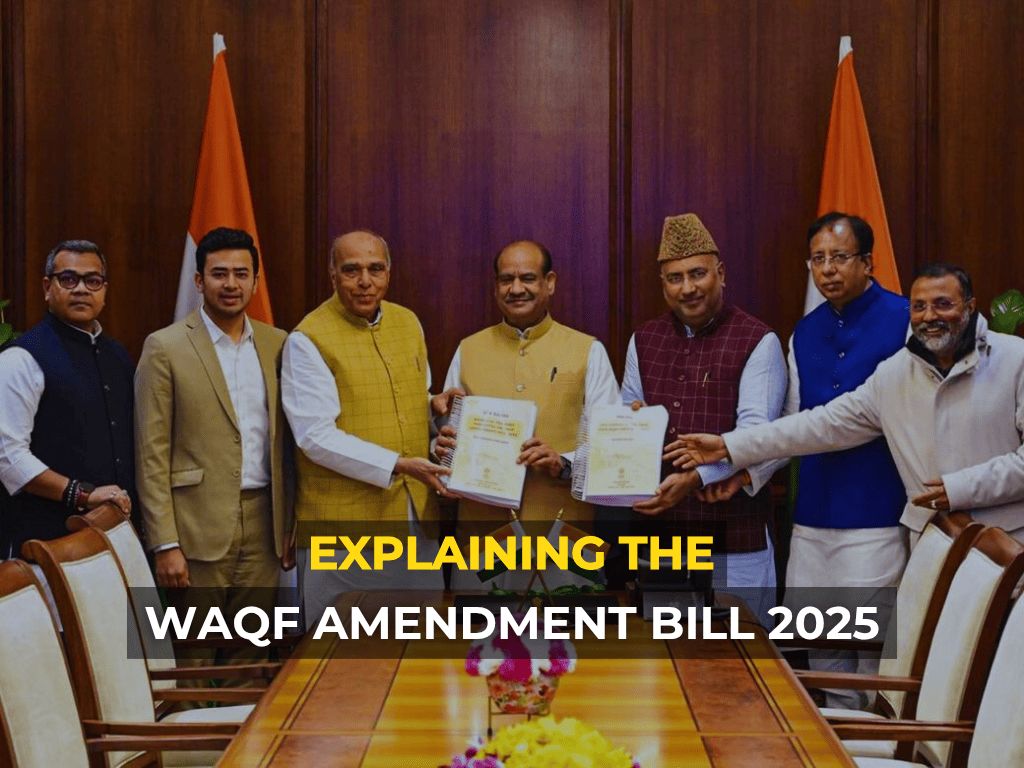
The Waqf Amendment Bill 2025 has been introduced to address the issues in the administration and management of Waqf properties all over India.
This Waqf amendment bill seeks to amend the Waqf Act, 1995, in order to enhance transparency, accountability, and improve the efficiency in the governance and management of the Waqf assets and resources.
Following are the issues which the aforementioned bill seeks to curb :
(1) Incomplete Land Surveys and Records
Many Waqf properties have not been properly registered till now which leads to a lot of unnecessary disputes. The Waqf Amendment Bill will make it necessary for all the properties under the Waqf board to be registered digitally to prevent any clashes.
(2) Exclusion of Women’s Inheritance Rights
The new Waqf Bill is aimed at providing gender-neutral provisions relating to inheritance rights. Earlier, the old laws did not mention women’s rightful share in Waqf properties.
(3) Rising Number of Legal Disputes
Courts have noted that there has been a major increment in cases against Waqf land encroachment. There were around 10,381 cases in 2013 which increased to 21,618 cases in 2025 currently. The new Waqf Amendment Bill aims at providing faster dispute resolution and speedy justice in land ownership disputes.
(4) Absolute Authority of the Waqf Board
The Waqf Board was controversially given some special powers and privileges that allowed them to be able to declare any property as Waqf land without external validation. This proved to be a blunder because the Waqf Board was seen illegally claiming non-Muslim and government property as theirs. This was against the spirit of fair donations of the Waqf properties and assets.
(5) Lack of Financial Accountability in the Waqf Board
The Waqf Board doesn’t have strict audits due to which all the funds were often misused. The new Waqf Amendment Bill ensures regular checks and financial transparency to stop any misuse of money and resources.
(6) Mismanagement of Waqf Properties
Many Waqf Board-owned properties have been misused or illegally sold. The Waqf Amendment bill introduces stricter rules to safeguard them from being exploited and mis-management.
(7) Disputes Over Government Land
There have been numerous conflicts where government land, as well as temple and church properties, have been claimed as Waqf property without proper documents or proof. The Waqf Amendment Bill establishes a clear legal mechanism to prevent unauthorized claims.
Why did the Waqf Amendment Bill 2025 become Controversial?
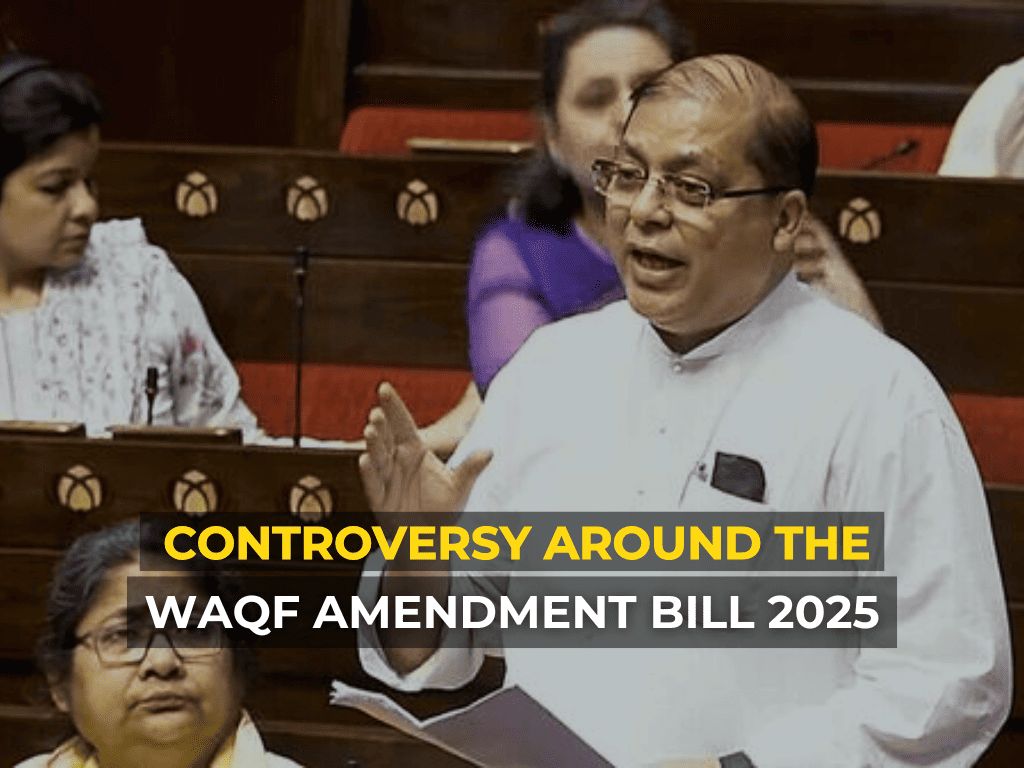
The Waqf Amendment Bill was previously introduced in the Lok Sabha last year in 2024. Upon opposition, it was sent to the JPC (Joint Parliamentary Committee) for review. The JPC was headed by BJP MLA Jagdambika Pal.
After a detailed investigation, the JPC submitted the final report in February 2025. After a week or so, this report was approved for the Union Cabinet.
Finally, on 2nd April 2025, a new version of the Waqf Amendment Bill was introduced in the Lok Sabha. This Bill aims to correct the issues with the Waqf Board which have appeared as a result of the Waqf Amendment 1995.
But the proposed changes have sparked debates across the country. The people opposing it claim that the amendment gives more power and authority to the district collectors and magistrates over Waqf property surveys. They fear that the government might seize or misuse Waqf properties.
People opposing it alleged that the bill proposes adding non-Muslim members to Waqf Boards which will interfere with the religious autonomy of the Muslim community.
Opponents of the Waqf Amendment Bill have a misconception that it will give excessive regulatory powers to the government. They mistakenly fear that the government will take control of historic mosques and Islamic properties under the pretext of regulation but this is not true.
In conclusion, opponents of the bill argue that it threatens the rights and autonomy of the Muslim community and their religious freedom is at risk.
However, these concerns are misconceptions, as the government does not intend to interfere with the religious freedom of any minority community, nor does it plan to control historic mosques.
Let us understand the actual changes introduced by the amendments, how they aim to address transparency issues and corruption charges, and how they improve the regulation and management of Waqf properties without compromising religious freedom or autonomy of the Waqf Board.
Key Highlights of the Waqf Amendment Bill 2024-25
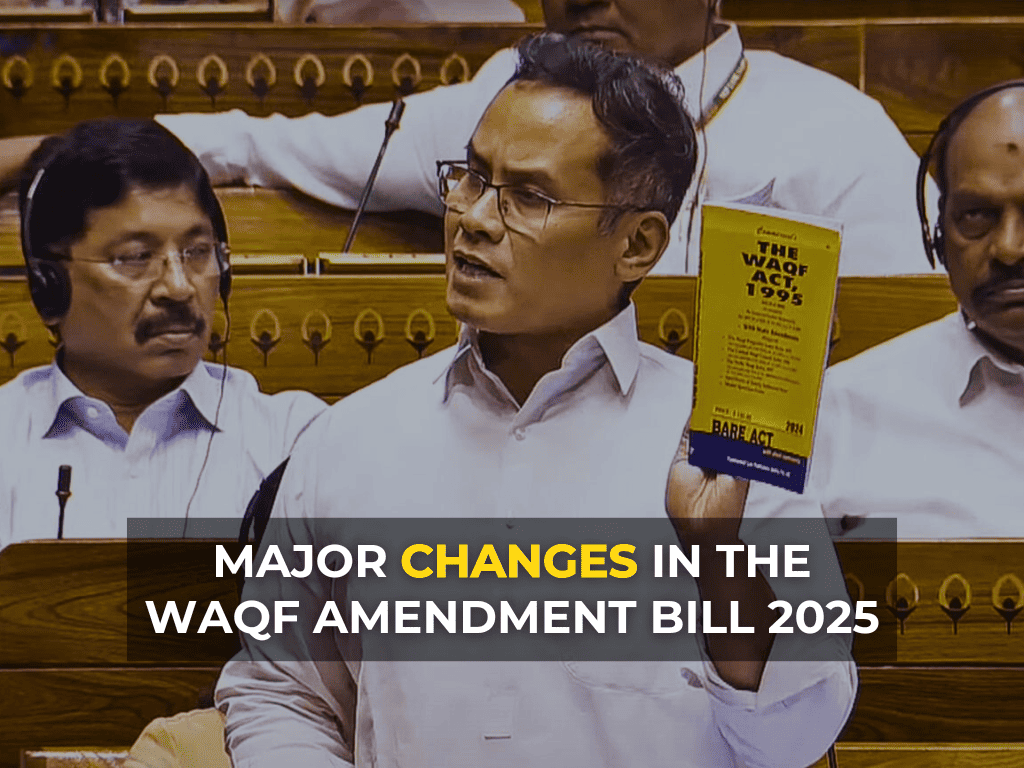
The Waqf Amendment Bill 2024 introduced many changes which were meant to bring regularity and address transparency issues. But after reviewing suggestions from the Joint Parliamentary Committee (JPC), some changes were made in the initial 2024 bill to address all the disputes and 14 new amendments have been made. Let’s break them down and clear misconceptions (if any).
(1) ‘Waqf by User’ Rule has been Changed :
Under this rule, any property automatically became a Waqf land if it had been used for religious purposes for a long time without any formal or legal documentation.
This rule was proposed to be removed through the Waqf Amendment Bill 2024, but upon opposition it is not removed. Now, the 2025 amendment restores this rule. And the properties that were already being used as Waqf land before the law’s enforcement will remain Waqf properties unless disputed.
But there is a new rule in this respect : Only the people who have been practicing Islam for more than 5 years can establish a Waqf. At least five years of practice has to be proved.
This has sparked debates, opponents state that this would alleniate the new converts from being able to donate properties to the Waqf Board for religious practices.
These amendments have been introduced to ensure uniformity, regularity and accountability. They aim to reduce the chances of arbitrary claims.
(2) Inclusion of Non-Muslims in Waqf Institutions
This has been claimed to be one of the most controversial amendments introduced by the Waqf Amendment Bill 2025. The new bill gives allowance to non-muslims to be a part of the Waqf Board under the State Waqf Boards, Waqf Tribunals and Central Waqf Council.
The Central Government now has the right to nominate three MPs (in which two MPs will be from the Lok Sabha and one will be from the Rajya Sabha) to the Central Waqf Council, without them being Muslims. So, now even non-muslims can be appointed by the Central Government. Although it doesn’t mandate them to be strictly non-muslims.
Another amendment includes a provision allowing the CEO of the State Waqf Board to be a non-Muslim. Moreover, the State Government should appoint at least two non-Muslims in the State Waqf Board.
One of the most significant amendments in the revised Waqf Bill is the mandatory inclusion of a State government’s senior officer in the Waqf Board (at least a Joint Secretary-level officer must be included) for handling Waqf matters on the Waqf Board. This was deemed necessary for better coordination among the authorities, faster decision making and preventing the misuse of Waqf properties.
Earlier, all the State Waqf Boards only had members from the community, legal experts, and other representatives, but it wasn’t necessary to have a senior level government officer for handling Waqf affairs.
Some critics are alleging that the interference of the government would disrupt the independence of the Waqf Board. But we must understand that this is meant for better functioning and coordination.
(3) Changes in Waqf Tribunals
Prior to these amendments, all the legal matters relating to the Waqf Board were settled by two member Waqf tribunals.
The new Waqf Amendment Bill 2025 introduces a system of three member tribunal, the members of which are as follows :
(I) A district judge (as the chairperson)
(II) A Joint Secretary-level officer from the State government ( for monitoring Waqf matters)
(III) An expert in Muslim law and jurisprudence
This addition of a legal expert will ensure that the decisions align with both civil laws and Islamic jurisprudence.
The opposition fears excessive government intervention but the inclusion of a senior level government officer will boost credibility and prevent misuse of Waqf properties.
(4) Changes in Waqf Surveys
That has been a major change in the processes of the Waqf Surveys as well. Earlier, the district collectors were in charge of Waqf Surveys. Now, only senior government officers (above collector rank) are allowed for surveys , especially where ownership is disputed.
The final report by the senior government officer will be followed. The property cannot be claimed by the Waqf Board unless the officer approves it. If the property is claimed to be someone else’s or government property then the property will be removed from the Waqf records.
The government had to address many complaints regarding these illegal and arbitrary claims by the Waqf Board. That’s why this change is deemed necessary to prevent the misuse and illegal controlling of properties by the Waqf Board.
(5) Online Registration of Waqf Properties
The revised Waqf Amendment Bill has proposed the formation of a centralised online database which will be responsible for the registration and management of all the properties under the Waqf Board.
Any new property which has to be declared as Waqf property will have to be submitted through this online portal only.
The digitization will enhance transparency in the Waqf Board and will lead to a better management of all the properties. This is aimed to reduce the mis-management and corruption so that all the resources and assets of the Waqf Board are used for their intended charitable purposes only.
Moreover, all the properties must be uploaded in the online database within 6 months of enactment of the Waqf Amendment Bill 2025.
In case someone missed the deadline, the Waqf Tribunal can extend the period if a valid reason is provided.
(6) Application of the Limitation Law
The Limitation Law states that in a case where someone’s property has been illegally encroached, then he or she can claim his/her property within a period limited 12 years only.
In the previous Waqf Act, this Limitation Act was not applicable in the case of the Waqf Board. The section 107 of the Waqf Act 1995, gave the Waqf board indefinite and unlimited time to claim the encroached properties.
But now in the revised Waqf Amendment Bill 2025, this controversial provision has been removed. So it means that there will be uniformity in all land dispute cases.
This means that if a person continues to use a property for more than 12 years without any opposition or someone challenging his right over the property, he will gain ‘Adverse Possession’ of the particular property or asset.
While people are arguing this to be unfair for the Waqf properties, they need to understand that every other land owner or institution follows the same Limitation Law. The removal of section 107 of the Waqf Act 1995 simply ensures that all the land matters in our country are treated similarly without any special privilege to some religious body.
(7) Increased Power of the High Court
Earlier, according to the Waqf Act 1995, the judgement or decision by the Waqf Tribunal was considered final. So, those who were unsatisfied by the decision couldn’t challenge it legally in higher courts.
But now with the revised Waqf Amendment Bill 2025, High Courts have been given jurisdiction over the Waqf Tribunal to ensure justice. High Courts will review the decisions made by the Tribunal to prevent any misuse of power.
Anyone who feels that the decision by the Waqf Tribunal is not fair, can appeal to the High Court within 90 days. This reform will boost judicial accountability, preventing arbitrary decisions and prompting a more balanced legal process.
Impact of the Waqf Amendment Bill 2024-25
The Waqf Amendment Bill 2025 is aimed at better maintenance of Waqf properties, preventing misuse and enabling the use of all assets and resources toward education, healthcare, and welfare for underprivileged minorities.
The amendments in the Waqf Amendment Bill 2025, are meant to improve constitutional fairness, uniformity, and secularism in property laws. The exclusive provisions that applied only to Waqf properties will be removed for equality.
No institution / body / land owner should be granted extraordinary exemptions that are not available to others.
Moreover, there must be a higher body which reviews the judgements by the Waqf Tribunal, therefore the role of High Courts is considered necessary for legal transparency.
The arbitrary and fraudulent claims will not be entertained anymore.
As we discussed the key changes, let us debunk the misconceptions relating to the revised Waqf Amendment Bill for better clarity.
Addressing Misconceptions Around the Waqf Bill 2025
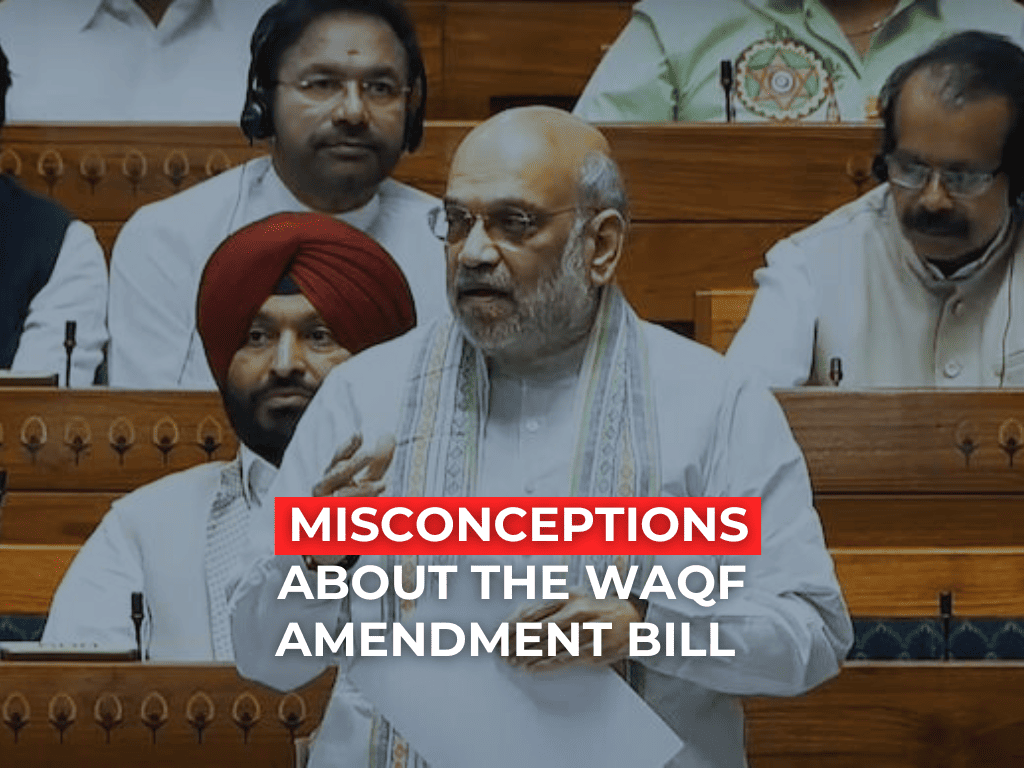
Hon’ble Home Minister Amit Shah addressed all the miscommunications and misconceptions in regard to the Waqf Amendment Bill 2025 and explained how the opposition is instilling fear among the minorities just for their vote bank politics.
Let us examine the realities behind the misconception surrounding the Waqf Amendment Bill 2025 :
(1) No Interference in Religious Activities
There are claims that the Waqf Amendment Bill 2025 will be interfering with the religious practices of Muslims and controlling their donations. However, the government has clarified that only financial and administrative transparency will be maintained. All the religious aspects of Waqf will rest with Muslims. The government will not interfere in religious affairs.
(2) Role of Non-Muslims in Waqf Management
There is a misconception that non-Muslims will take over Waqf properties. In reality, only the Charity Commissioner can be non-muslim who will be responsible for administrative oversight. The main powers relating to Waqf management remains with Muslims.
(3) Protecting Waqf Lands
There is a misconception that the bill will take away Waqf lands. But in reality, it ensures that Waqf cannot claim someone else’s land or government property as their own without any official proof. Also, the Waqf Amendment Bill 2025 doesn’t have a retrospective effect which means that the properties which belonged to the Waqf Board will remain under it. And new property can easily be added by registration on the online portal.
(4) Ensuring Transparency in the Waqf Board
The new Waqf Amendment Bill 2025 will enhance the welfare-oriented functionality of the Waqf Board because now there will be no scope of fund leakages. Every property or asset under the Waqf Board will be supervised to prevent its illegal selling.
As we have discussed earlier, in some cases, the Waqf lands were leased to powerful authoritative people at lesser rates for their personal gains which led to financial losses for the Waqf Board. Now, there will be no scope of such frauds.
(5) Extended Discussions on the Waqf Amendment Bill
Some opposition leaders claim the bill was rushed. However, it was debated for at least 16 hours in both the houses. Around 38 committee meetings were held. Additionally, 1 Crore online suggestions were taken to form the final revised Waqf Amendment Bill 2025. So there is no scope of “haste makes waste”.
(6) Restoring the Original Waqf Act
While addressing the Lok Sabha, honorable home minister Amit Shah stated that this Waqf Amendment Bill 2025 would not have been necessary if the Waqf Act was not amended earlier by the UPA government. He also compared how the previous Waqf Amendment Bill was rushed and only discussed for 5 hours in the parliament but the current Waqf Amendment Bill 2025 has been subjected to prolonged and extensive debates & discussions for at least 16 hours in both houses of the parliament. So there is no scope of mistakes.
While some criticize the Waqf Amendment Bill 2025 to be unconstitutional, it has to be noted that the recent will is only focused on removing the arbitrary and controversial provisions which were added by the previous amendments.
Frequently Asked Questions (FAQs)
Here, we address the most common questions related to the Waqf Amendment Bill 2025, its impact, and the changes it proposes. These FAQs aim to clear doubts, debunk misconceptions, and provide accurate information in a simplified manner.
What is Waqf Board?
Waqf Board is an independent and autonomous Islamic body which is responsible for the proper management of Waqf properties.
What is Waqf and Waqf property?
‘Waqf’ means donating property or money permanently for religious purposes relating to Islam. Waqf properties are those properties who have been donated as ‘Waqf’. Once given, those properties cannot be sold, gifted, or inherited.
What is the Waqf Amendment Bill 2025?
The Waqf Amendment Bill 2025 is aimed at improving transparency, financial accountability, and management of Waqf properties while preventing illegal land claims and encroachment.
Will the Waqf Properties be demolished?
No, there will be no changes in the existing Waqf properties. The new Waqf Amendment Bill 2025 does not take away Waqf properties but ensures that they are properly managed, audited, and protected from illegal transactions or misappropriation.
Is the Waqf Amendment Bill 2025 Passed?
Yes, the Waqf Amendment Bill 2025 has been passed in both the Lok Sabha and the Rajya Sabha.
When was the Waqf Amendment Bill 2025 passed in Lok Sabha?
The Waqf Amendment Bill 2025 was passed in the Lok Sabha on 3rd April 2025 at 2:08 AM with 288 votes in its favour and 232 votes against it after a extended 12 hours long debate.
When was the Waqf Amendment Bill 2025 passed in the Rajya Sabha?
The Waqf Amendment Bill 2025 was passed in the Rajya Sabha on 4th April 2025 at around 2:29 AM.
Will non-Muslims control Waqf properties?
No, Waqf properties will stay under Muslim management. The government will only ensure transparency and stop corruption.
How does the Waqf Amendment Bill 2025 protect temple and church properties?
The Waqf Amendment Bill 2025 ensures that the Waqf Board can’t claim any religious property like temples and churches without any legal justification.
Which controversial provisions have been removed from the Waqf Act?
Provisions that allowed the Waqf Board to claim properties without due legal process have been removed in the Waqf Amendment Bill 2025.
What was the voting result for Waqf Bill 2025 in the Rajya Sabha?
The Waqf Amendment Bill 2025 got 128 votes in favour whereas 95 votes against it.
Conclusion
The Waqf Amendment Bill 2025 has been a controversial topic. The opposition is protesting against it claiming it to be unconstitutional while the ruling party explains that this bill is meant to undo the extra powers which were bestowed upon the Waqf Board.
The Waqf Board has been criticised for misuse of funds and illegally selling or providing the Waqf properties on lease for personal gains. To curb all such issues, the Waqf Amendment Bill 2025 has been passed. It will ensure better functioning and utilisation of the Waqf properties and assets for noble deeds.
Additionally, we have also discussed some of the major misconceptions regarding the revised Waqf Amendment Bill 2025 for better understanding. The Waqf Amendment Bill 2025 has become one of the most debated bills in the history of independent India. With this detailed report, we hope that all the details about the Waqf Amendment Bill 2025 are clear to you.
Moreover, we have also discussed what were the challenges before the parliament due to which this bill was necessary and how it is aimed at the collective welfare of the minorities and our country as a whole. The revised Waqf Amendment Bill 2025 will ensure that the constitutional rights most importantly Secularism, Independence of Judiciary, Rule of Law etc are followed in its true sense.
We had previously covered this topic when the Waqf Amendment Bill 2025 was passed in the Lok Sabha, you can read the article here.
We appreciate you taking the time to read this detailed analysis of the Waqf Amendment Bill 2025.
At LittiChokha, we bring to you the most accurate, in-depth, and insightful coverage of Bihar’s history, culture, tourism updates, news, and key policy changes.
From exam updates, new government schemes to competitive exams like BPSC, we ensure you stay informed about everything!
Along with Bihar related topics, we also cover major national headlines and issues that impact every Indian. Subscribe to our website to get the most reliable information as quickly as possible!
LittiChokha is one of the leading News & Media company based in Patna, Bihar. We make sure the news we provide is authentic and has undergone multiple Fact-Checks.





